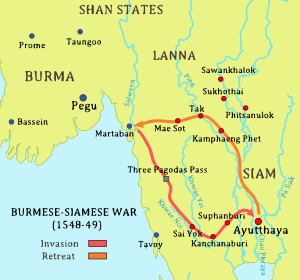Burmese–Siamese War (1548)
| Burmese–Siamese War (1547–1549) | |||||||
|---|---|---|---|---|---|---|---|
| Part of Burmese–Siamese wars | |||||||
 Map of the 1548–1549 campaign |
|||||||
|
|||||||
| Belligerents | |||||||
| Toungoo Dynasty (Burma) |
|
||||||
| Commanders and leaders | |||||||
|
Tabinshwehti Bayinnaung Saw Lagun Ein Thado Dhamma Yaza Mingyi Swe Diogo Soares |
|
||||||
| Units involved | |||||||
|
Royal Burmese Army Royal Burmese Navy Portuguese mercenaries |
Portuguese mercenaries |
||||||
| Strength | |||||||
|
1547–48 12,000 troops
1548–49
|
1547–48 1548–49 |
||||||
1547–48 12,000 troops
1548–49
1547–48
6000 troops
The Burmese–Siamese War (1547–49) (Burmese: ယိုးဒယား-မြန်မာစစ် (၁၅၄၇–၄၉); Thai: สงครามพม่า-สยาม พ.ศ. 2090–92 or สงครามพระเจ้าตะเบ็งชเวตี้, lit. "Tabinshwehti's war") was the first war fought between the Toungoo Dynasty of Burma and the Ayutthaya Kingdom of Siam, and the first of the Burmese–Siamese wars that would continue until the middle of the 19th century. The war is notable for the introduction of early modern warfare to the region. It is also notable in Thai history for the death in battle of Siamese Queen Suriyothai on her war elephant; the conflict is often referred to in Thailand as the War that Led to the Loss of Queen Suriyothai (สงครามคราวเสียสมเด็จพระสุริโยไท).
The casus belli have been stated as a Burmese attempt to expand their territory eastwards after a political crisis in Ayutthaya as well as an attempt to stop Siamese incursions into the upper Tenasserim coast. The war, according to the Burmese, began in January 1547 when Siamese forces conquered the frontier town of Tavoy (Dawei). Later in the year, the Burmese forces led by Gen. Saw Lagun Ein retook the Upper Tenasserim coast down to Tavoy. Next year, in October 1548, three Burmese armies led by King Tabinshwehti and his deputy Bayinnaung invaded Siam through the Three Pagodas Pass. The Burmese forces penetrated up to the capital city of Ayutthaya but could not take the heavily fortified city. One month into the siege, Siamese counterattacks broke the siege, and drove back the invasion force. But the Burmese negotiated a safe retreat in exchange for the return of two important Siamese nobles (the heir apparent Prince Ramesuan, and Prince Thammaracha of Phitsanulok) whom they had captured.
...
Wikipedia
